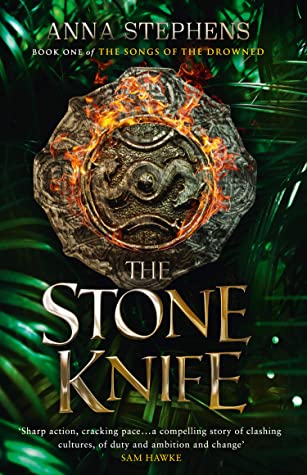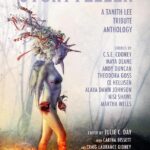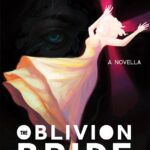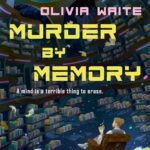
Genres: Fantasy, Epic Fantasy, Queer Protagonists
Representation: Central American-coded cast, Deaf MC, M/M, bi/pansexual MC, queernorm world
PoV: 3rd-person, past-tense, multiple PoVs
ISBN: B0875ZRBCW
Goodreads

A fantasy epic of freedom and empire, gods and monsters, love, loyalty, honour, and betrayal, from the acclaimed author of GODBLIND.
For generations, the forests of Ixachipan have echoed with the clash of weapons, as nation after nation has fallen to the Empire of Songs – and to the unending, magical music that binds its people together. Now, only two free tribes remain.
The Empire is not their only enemy. Monstrous, scaled predators lurk in rivers and streams, with a deadly music of their own.
As battle looms, fighters on both sides must decide how far they will go for their beliefs and for the ones they love – a veteran general seeks peace through war, a warrior and a shaman set out to understand their enemies, and an ambitious noble tries to bend ancient magic to her will.
Highlights
~a ‘guild’ of deaf monster-hunters
~music is a weapon
~a charm for every wedded promise
~bring down the pyramids
~do not expect a happy ending
Stephens’ first trilogy was – so I was told – grimdark, which made me hesitate in picking up The Stone Knife. If you’ve hung around here for a little bit, you know I definitely do not have the stomach for grimdark! So I wasn’t at all sure I’d be able to handle Stephens’ newest book (which I am very late to; it was released in 2020).
But I just couldn’t resist Epic Fantasy in a setting inspired by ancient Central America. I mean, who could?!
Reader, I dipped my toe in – and the very first character I met was Xessa, a Deaf woman who fights monsters with her incredible service dog Ossa!
I WAS SOLD SO HARD.
Which is not to say that The Stone Knife isn’t fucking dark, because quite a lot of it really, really is. This is in huge part a book about war, and that means violence, and Stephens doesn’t try to make it pretty for us. There’s slavery, and human sacrifice (not Aztec-style), and killing for pleasure – all of which is on top of the sadistic, man-eating monsters that the empire called the Setatmeh and Xessa’s people call the Drowned. Near the end of the book, one of the service dogs is killed horribly (not Ossa). You should know all of this going in.
But for me, personally, the story was worth it. I freely admit that I started skimming the scenes of violence/war after about the halfway point, and that probably helped. Things get so unbelievably fucked-up. But Stephens has created a really cool world and populated it with a brilliant cast, and I just had to know how it all went down.
The Empire of Songs is massive, and practically all-powerful. At the heart of their power is the Song, a magical, mind-influencing music created by the holy Singer and transmitted via the empire’s pyramids so that every citizen and slave is, as they put it, ‘under the Song’. The Song is beautiful, hypnotising, and convinces all who hear it that the empire is the greatest good. What the Singer sees, feels and experiences is transmitted into the Song to affect everyone who hears it, and so he is surrounded with beauty and peace, and is absolutely forbidden to engage in violence.
That last bit is especially important.
The empire’s goal is to waken the world-spirit – which can only be accomplished once everyone lives under the Song.
The Takob – Xessa’s people – are Not Fucking Interested. But the empire is coming, whether they like it or not.
There’s just so much to love here. Xessa is unquestionably my favourite; fiery and unbreakable, she’s an ejab, one of those who fight the Drowned in order to get water for their city. Since the Drowned have siren-song magic of their own, ejab are those who are either born deaf or become so through accident or age, and those who use spirit-magic to become temporarily deaf and immune to the Drowned. I absolutely adored how vital this made Deaf people to the community, how everyone speaks sign-language as a matter of course because the ejab are not social outcasts, but honoured, and no one wants them to feel excluded from the people around them. Xessa herself gets a frustrating taste of that exclusion from some of the refugees fleeing the empire, who do not speak sign, and all the tiny (and not-so-tiny) culture-clashes like this just made the whole situation feel very real.
Xessa’s closest friend and his husband are both PoV characters as well: Tayan, a shaman who’s been Xessa’s friend from childhood, and Lilla, a high-ranking warrior. (This is a queernorm setting; no one bats an eye at two men being married, not even in the Empire.) Both of them bring very different perspectives to the story; Tayan is hopeful that the empire can be reasoned with, while Lilla is forced to brace for the fact that reasoning is probably not going to work. Through Tayan especially, we glimpse the vast differences between Takob and Empire culture, gulfs that are simply never going to be able to be bridged – and yet Tayan is the one who starts to find himself seduced by the Song, even as he’s (rightfully!) horrified by…pretty much everything else about the empire.
On the other side of the divide, we have Enet, primary lover of the Singer, mother of his son, and one of the highest-ranking officials in the Empire; Pilos, a general who truly believes in what he’s fighting for; and…another character I’m not going to talk about, because there’s no way to do so without spoilers. It’s clear that we’re meant to despise Enet and, albeit reluctantly, respect Pilos, and I’d say that Stephens is very good at making us do so. Pilos is loyal, clever, and respects his enemies even as he destroys them; Enet gets what she wants with sex and carefully cultivated devotion. I have to admit, I’m Tired of reading about women who use sex to gain power…but there’s no slut-shaming vibes or anything, and we’re never left in doubt of Enet’s incredible intelligence and determination. Sure, sex is one of her tools; why not? If it works? Surely that’s more damning of the Singer than Enet herself.
And Enet has a great deal more than sex to work with. She’s read books that shouldn’t exist, and knows far more than anyone is supposed to about the Singers and how their power works.
It gets messy.
The Stone Knife is intrigue and magic and war, the clashing of cultures and faiths, in a world not quite like anything I’ve ever seen before. There are secrets and horrors and reveals, love and monsters and family that goes beyond blood, desperate acts and terrible ones. It is not a hopeful book; the Empire is implacable and merciless, and it’s not really a spoiler to say that it’s clear how it’s all going to end by the time you’re halfway through the story. It’s the rest of the trilogy that is a giant question mark; I have no idea where this series is going, if the Empire can be brought down, if the world-spirit can actually be awakened, what the hell songstone really is. Is this a story about empires, or is the fate of the world at stake too? What’s going to happen to all of the characters? Is there a way to deal with the Drowned permanently? I HAVE SO MANY QUESTIONS!
If you don’t mind your Fantasy fairly brutal, and are Tired of Medieval Europe settings, then this is a damn good book that needs to be on your list. The prose is clear and clean (even when the scenes very much aren’t), with invented idioms and such woven throughout to make it interesting; the cast is phenomenal, even the characters we’re supposed to hate; and the attention to detail throughout the worldbuilding is fantastic. The plot is on an inevitable grim, downward spiral of despair and awfulness, but that doesn’t mean various twists won’t have you gasping (or gagging).
And honestly, the whole thing is worth it just for the amazing monster-hunting service dogs!






I need to catch up on this – I’ve got a gorgeous hardback from when I was subscribed to the Goldsboro SF Fellowship and I surprised myself by enjoying Godblind in spite of it being ultra violent and very dark (“Things get so unbelievably fucked-up” is a good descriptor for that too). The Stone Knife sounds fab – time to make a plan.
I should probably avoid Godblind then, alas! But I really hope you get the chance to try out Stone Knife eventually – as you can tell, I was impressed!